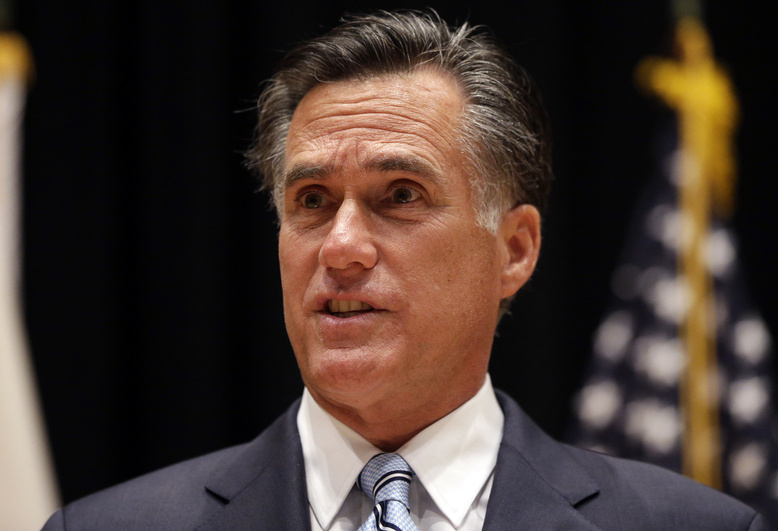Mitt Romney told a private audience of campaign donors in May that the pursuit of Middle East peace is likely to remain “an unsolved problem” because the Palestinians have “no interest whatsoever” in reaching a peace agreement with Israel.
Apart from the immediate political fallout, the remarks could compromise the Republican presidential candidate’s standing as an honest broker in the peace process should he win the election.
“I look at the Palestinians not wanting to see peace anyway, for political purposes, committed to the destruction and elimination of Israel, and these thorny issues, and I say there’s just no way,” Romney said.
New videos released Tuesday by Mother Jones magazine show Romney responding to a question about how “the Palestinian problem” can be solved. He replied by suggesting that “the Palestinians have no interest whatsoever in establishing peace and that the pathway to peace is almost unthinkable to accomplish.”
The candidate’s more pessimistic comments on peace in the Middle East put him at odds with the Republican Party platform, which expresses support for “two democratic states — Israel with Jerusalem as its capital and Palestine — living in peace and security,” adding: “For that to happen, the Palestinian people must support leaders who reject terror, embrace the institutions and ethos of democracy, and respect the rule of law.”
Romney’s comments could marginalize the more moderate Palestinians seeking peace negotiations with Israel and empower the armed groups, which argue that peace talks are futile.
In light of those differences, Romney suggested that the best U.S. policy may be to “hope for some degree of stability, but you recognize that this is going to remain an unsolved problem. We live with that in China and Taiwan. All right, we have a potentially volatile situation, but we sort of live with it, and we kick the ball down the field and hope that ultimately, somehow, something will happen and resolve it. We don’t go to war to try and resolve it imminently.”
Romney also accused President Obama of harboring “an extraordinarily naive perception” that some of the world’s most hard-line leaders would sit down and talk to him about their differences.
Romney rarely discusses his views on U.S. foreign policy on the campaign trail and most recently faced criticism for a seemingly premature attempt to speak out following anti-American protests in Egypt and Libya. In the videos, he is shown addressing a group at a May 17 fundraiser in Boca Raton, Fla., at the home of Marc J. Leder, a private-equity manager, according to Mother Jones.
Many of Romney’s most pointed comments came in response to audience questions, captured by hidden camera. He took the opportunity to draw a colorful contrast between his approach to foreign policy and Obama’s.
“The centerpiece of American policy has to be strength,” he said, adding that his approach would be “speaking softly and carry a very, very, very big stick. This president speaks loudly and carries a tiny stick,” he said.
Romney has made similar comments about the Israeli-Palestinian conflict before and has always spoken skeptically about the prospect for a so-called two-state solution as part of a peace agreement. But he told the Israeli newspaper Haaretz in July that he supports the creation of a Palestinian state.
That policy — the creation of a Palestinian state alongside Israel — has been U.S. policy for several presidencies and it is the solution Obama has pursued.
Romney also did not distinguish among rival Palestinian factions in his comments, suggesting that all Palestinians are “committed to Israel’s destruction.”
The armed Islamist party Hamas, which governs the Gaza Strip, has refused to acknowledge Israel’s right to exist and calls for its destruction in its founding charter. But the secular Fatah movement and the Palestine Liberation Organization, the main umbrella organization that excludes Hamas, recognized Israel in the early 1990s and continue to seek a two-state solution.
During a visit to Israel in July, Romney offended Palestinians by saying that “culture makes all the difference” in explaining why Israel is vastly more successful economically than the Palestinian territories. Palestinian leaders quickly fired back.
“All I can say is that this man needs a lot of education,” said Saeb Erekat, a top aide to Palestinian Authority President Mahmoud Abbas. “He doesn’t know the region, he doesn’t know Israelis, he doesn’t know Palestinians, and to talk about the Palestinians as an inferior culture is really a racist statement.”
Send questions/comments to the editors.



Comments are no longer available on this story